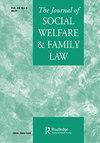追讨超额付款的酌处权
IF 0.6
Q2 LAW
引用次数: 0
摘要
R诉工作和养老金国务秘书[2023]EWHC 233(行政)案对工作和养老金部(DWP)长期以来的做法至少有三个方面提出了质疑。该案涉及DWP放弃收回超额付款的自由裁量权。在以前,关于追回的规则只规定索赔人在谎报或未披露重大事实的情况下承担责任。税收抵免要求低收入家庭偿还大量错误交付的款项——监察员谴责这一过程“根本不适合”他们的需求(议会和服务监察员,2007年,第5页)。在这个例子之后,2013年引入了从其他福利中收回超额支付的一般权力,管理通用信贷、求职者津贴和就业与支持津贴。在本案中,DWP“多次”误判了福利,并向索赔人保证付款是正确的。索赔人已采取“一切合理步骤,反复澄清她的权利并提供信息”(第1段)。毫无疑问,超额支付是官方错误造成的。DWP为“这一严重的服务失误”道歉。索赔人在三份单独的申请中要求DWP行使其放弃还款的自由裁量权,但DWP在每一点上都拒绝了。本案提出的第一个问题涉及DWP对其自由裁量权的使用。几十年来——至少自20世纪60年代以来——DWP及其前身通过制定国家规则来限制其自由裁量权的使用,旨在确保国家不同地区的判决之间不存在不一致(Hill 1969,Spicker 2011)。这里行使的“自由裁量权”是国防部允许的自由裁量,而不是个别官员的判断。2012年,时任初级部长克里斯·格雷林向议会解释道:“将有一个绝对明确的行为准则来管理将采取或不采取恢复行动的情况,以确保一致、深思熟虑的决策”(引用第122段)。事实证明,行为准则并不认为DWP的严重过失可以被视为不寻求追回的充分理由。(未发表的)指导意见(第37段引用)指出:本文章由计算机程序翻译,如有差异,请以英文原文为准。
Discretion in overpayment recovery
R v Secretary of State for Work and Pensions [2023] EWHC 233 (Admin) calls into question at least three aspects of the long-established practice of the Department for Work and Pensions (DWP). The case concerns the DWP’s discretionary power to waive the recovery of overpayments. In former times, the rules governing recovery only rendered claimants liable if they had misrepresented or failed to disclose a material fact. Tax Credits had required low income families to repay substantial amounts of money delivered in error – a process the Ombudsman condemned as ‘fundamentally unsuited’ to their needs (Parliamentary and Service Ombudsman 2007, p. 5). Following this example, in 2013 a general power to recover overpayments from other benefits was introduced, governing Universal Credit, Jobseekers Allowance and Employment and Support Allowance. In the present case, the DWP had ‘repeatedly’ miscalculated the benefit, and assured the claimant that the payments were correct. The claimant had taken ‘all reasonable steps to repeatedly clarify her entitlement and provide information’ (para. 1). There was no dispute that the overpayment was the result of official error. The DWP had apologised for ‘this profound lapse in service’. The claimant asked the DWP in three separate applications to exercise its discretion to waive repayments, and the DWP refused at every point. The first issue this case raises concerns the DWP’s use of its discretion. For decades – at least since the 1960s – the DWP and its predecessors have limited their use of discretion by the development of national rules, intended to ensure that there is no inconsistency between judgements made in different parts of the country (Hill 1969, Spicker 2011). The ‘discretion’ being exercised here is the discretion permitted to the Department, not the judgment of individual officers. In 2012, the then junior minister Chris Grayling explained to Parliament: ‘There will be an absolutely clear code of practice that will govern the circumstances in which recovery action will or will not be taken, to ensure consistent, considered decision making’ (cited at para. 122). As it turned out, the code of practice did not consider that the egregious fault of the DWP could be considered a sufficient reason for not pursuing recovery. The (unpublished) guidance (cited at para 37) states:
求助全文
通过发布文献求助,成功后即可免费获取论文全文。
去求助
来源期刊
CiteScore
2.00
自引率
13.30%
发文量
52
期刊介绍:
The Journal of Social Welfare & Family Law is concerned with social and family law and policy in a UK, European and international context. The policy of the Editors and of the Editorial Board is to provide an interdisciplinary forum to which academics and professionals working in the social welfare and related fields may turn for guidance, comment and informed debate. Features: •Articles •Cases •European Section •Current Development •Ombudsman"s Section •Book Reviews

 求助内容:
求助内容: 应助结果提醒方式:
应助结果提醒方式:


